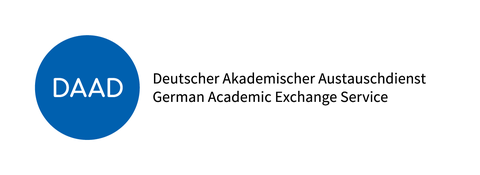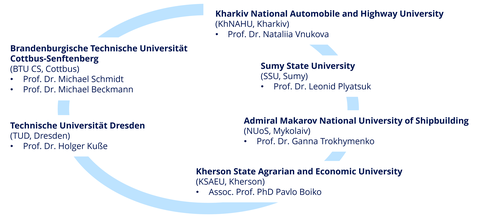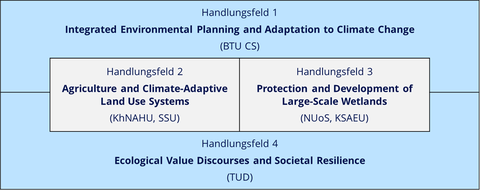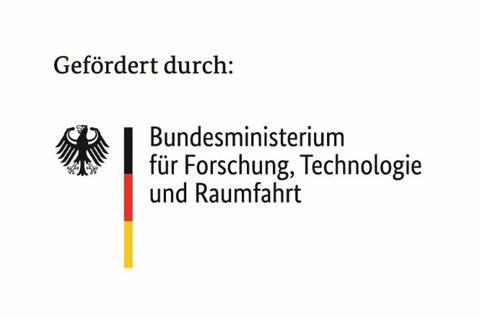CRES-Network - Home page
CRES-Network
Climate Change Resilient Natural Resource Management Network
Funded within the framework of the funding program "German-Ukrainian University Network 2025-2029" by DAAD
Duration: 01.07.2025 - 30.06.2029
Project consortium:
Project objective
Technical concept "Climate Resilience Strategies for Natural Resources "
Project activities
Contact
Project objective
The "Climate Change Resilient Natural Resource Management Network" project aims to strengthen sustainable cooperation between German and Ukrainian universities by establishing a curricular focus on "Climate Resilience Strategies for Natural Resources", implementing an international mobility program for field research internships and providing further training measures for academic and administrative staff in a targeted manner, to train German and Ukrainian students in the areas of climate adaptation, sustainable resource use and social resilience, to promote practical research in cooperation with nature conservation areas and to create the basis for a joint German-Ukrainian double-degree Master's program in the long term.
Specialist concept "Climate Resilience Strategies for Natural Resources"
The CRES-Network project combines science, practice and societal responsibility in an interdisciplinary approach. It focuses on four areas of activity that together aim to achieve climate adaptation, sustainability and social resilience.
1. integrated environmental planning and climate change
Climate change is one of the greatest challenges facing the environment and society. This area of activity develops strategies for climate-adapted land use that combine ecological, planning and agricultural perspectives. The focus is on combining environmental planning, spatial planning and nature conservation in order to create sustainable solutions for Ukraine and international partners.
2. agriculture and climate-adapted land use systems
Ukraine's fertile black earth soils are unique in the world - and at the same time highly endangered by war and climate change. Innovative, sustainable cultivation methods are being researched to preserve soil fertility, biodiversity and food security in the long term. Modern technologies, climate-resistant plants and new teaching and research approaches are intended to strengthen sustainable agriculture.
3. protection and development of large-scale wetlands
Wetlands are key ecosystems for climate protection and water regulation. The CRES-Network project supports their restoration and sustainable management - especially in regions that have been damaged by war or environmental change. The aim is to develop modern concepts for renaturation, water quality and flood protection in line with European environmental standards.
4 Ecological value discourses and social resilience
Sustainable reconstruction requires not only technology, but also strong communities. The CRES-Network project promotes social resilience through environmental education, participatory processes and awareness-raising for ecological values. This creates a model of how democratic societies can overcome crises and shape a sustainable future together - in Ukraine and beyond.
Project activities
- Establishing and strengthening cooperation between German and Ukrainian universities and other international partners.
- Training programmes for the administrative staff of the participating universities with a focus on internationalization and crisis management.
- Further training courses for academic staff at the participating universities to acquire additional professional and didactic qualifications for high-quality teaching in international degree programs.
- Digital language learning opportunities to support international cooperation and mobility (English, German and Ukrainian courses for all target groups).
- Development and implementation of the curricular focus "Climate Resilience Strategies for Natural Resources" at the participating universities.
- Establishment of a long-term international mobility program for field research internships in German and Ukrainian natural areas for German and Ukrainian students.
Contact:
Marianna Schulz, M.A.
Research Associate and Coordinator of the project consortium
+49 351 463 35947





